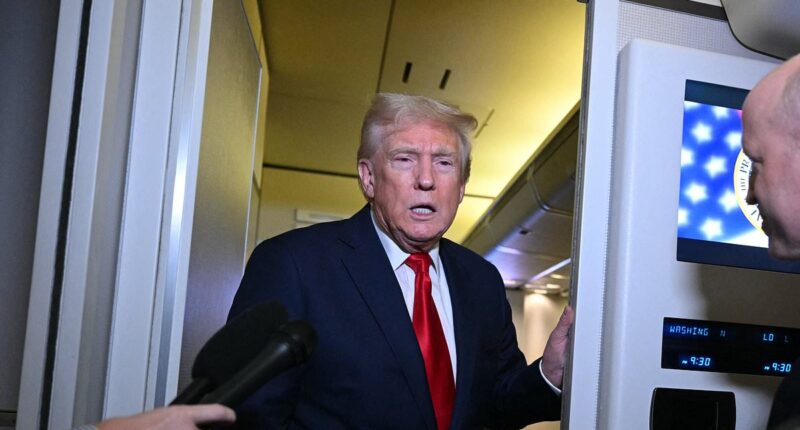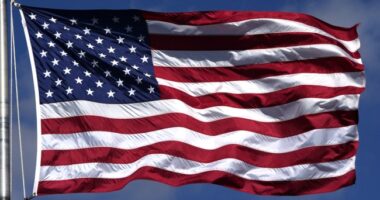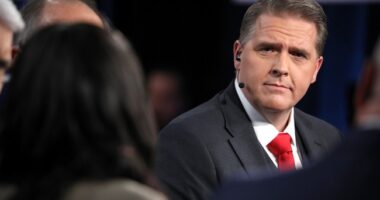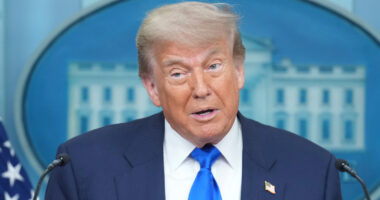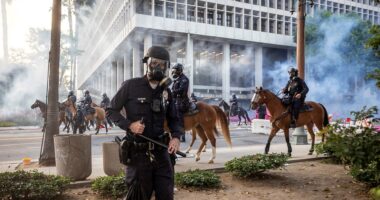President Donald Trump has justified his tariff hikes by saying products need to be made in the United States in case it goes to ‘war.’
The decision to produce our medications within the United States is rooted in the need for self-reliance during times of conflict, according to statements made by Trump during a session aboard Air Force One on a Sunday evening. By taking this measure, the country aims to reduce dependence on China and other nations, a move that Trump believes is crucial.
Fears of an economic downturn have been fueled by Trump’s actions to restrict the influx of foreign goods, a strategy aligned with his goal to promote domestic manufacturing. His primary objective is to bolster the production sector within the nation.
While Trump contemplates the imposition of additional tariffs, Chinese President Xi Jinping, who was on an official visit to Vietnam as part of his tour of Southeast Asia, issued his own cautionary statements highlighting the potential consequences.
‘There are no winners in a trade war, or a tariff war,’ Xi wrote in an editorial jointly published in Vietnamese and Chinese official media.
‘Our two countries should resolutely safeguard the multilateral trading system, stable global industrial and supply chains, and open and cooperative international environment.’
He added: ‘Trade war and tariff war will produce no winner, and protectionism will lead nowhere.’

President Donald Trump spoke to reporters on Air Force One on Sunday night
Xi is making the trip to shore up alliances and find solutions for the trade war with Trump. After Vietnam, the Chinese president is expected to go to Malaysia and then Cambodia.
China has been a top target for the White House.
Trump put a 90-day pause on many of his on-again, off-again reciprocal tariffs but left in place a 145 percent import tax on goods from China.
In response, Beijing suspended exports of certain rare earth minerals and magnets that are crucial for the world’s car, semiconductor and aerospace industries.
The move could affect American factories across the country, particularly in the auto industry. Many of the minerals make up components of a vehicle’s motor.
Trump’s top economic adviser said China’s action was ‘concerning.’
‘They’re concerning. And we’re thinking about all the options right now,’ Kevin Hassett said outside the White House. ‘Rare earths are a part of lots of the economy. It’s a little bit of the value add to the US economy, but a crucial part of the value added.’
He said the administration was helping small businesses that relied on supplies out of China find alternative resources.
The officials understand ‘their concerns and are thinking about how best to address them, including by finding other suppliers that are not on the current list that China is on,’ he said.
Until 2023, China produced 99 percent of the world’s supply of heavy rare earth metals.
China also produces 90 percent of the world’s nearly 200,000 tons a year of rare earth magnets, which are far more powerful than conventional iron magnets.
‘The White House is concerned about China. Period,’ Hassett noted.
And there may be more tariffs to come.
Trump said on Sunday that semiconductor tariffs will ‘take place in the very near future,’ but expressed some ‘flexibility’ regarding tariffs on products such as iPhones and tablets.
‘The tariffs will be in place in the not-too-distant future,’ he said.
The U.S. markets opened slightly higher Monday off the news that Smartphones, computers, memory chips and several other categories of products will be exempt from tariffs.
Trump, however, warned they might still be targeted although he said he will be ‘flexible’ on the matter.
‘That’s going to be announced very soon, and we’ll be discussing it, but we’ll also talk to companies. You know, you have to show a certain flexibility. Nobody should be so rigid.’

Chinese President Xi Jinping is on a tour of Southeast Asia

Door frames are seen inside the Hyundai Motor Manufacturing Alabama (HMMA) facility in Montgomery, Alabama
Meanwhile there is growing concern in corporate America about the volatility the tariff war is causing in the global stock markets.
A majority of America’s top business executives are worried the country could enter a recession soon, a new survey found.
In a poll of more than 300 CEOs conducted in April, 62 percent said they see a recession or other economic downturn in the next six months, according to Chief Executive, an industry group that runs the survey. That’s up from 48 percent who said the same in March.
‘Right now, we are at a decision-making point and very close to a recession,’ Ray Dalio, the founder of Bridgewater Associates, one of the world’s largest hedge funds, told NBC’s Meet the Press on Sunday.
‘And I’m worried about something worse than a recession if this isn’t handled well.’
